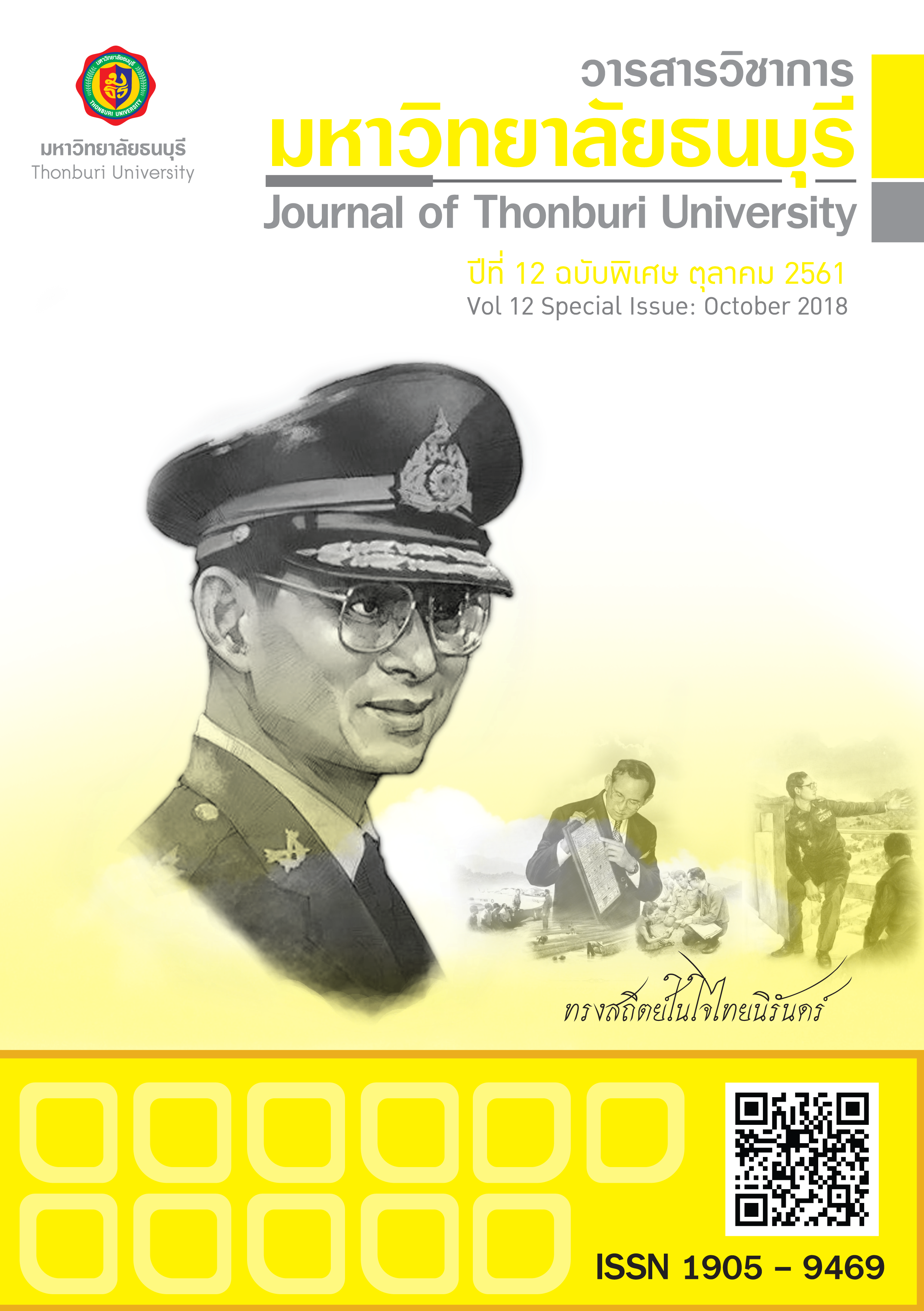BOOSTING MORAL FOR YOUTH USING COOPERATIVE AND TEAM BASED LEARNING
Keywords:
Boosting Moral, Relative Moral, Cooperative Learning, Team Based LearningAbstract
Abstract
The purposes of this research are to develop a process of boosting moral for youth program using cooperative and team based learning approaches, and to test the comparative experiments in the program effectiveness on cognition of relative moral. Qualified 150 youths, on the voluntarily basis, participated in the study. The Pre-test and Posttest Design (One - Group) are employed for this investigation. The study comprises 3 main stages: 1) Pre-experimental stage by using a test of cognition of relative moral; 2) Experimental stage in which Process of boosting moral for youth program using cooperative and team based learning approaches; and 3) Post-experimental stage into Pre-experimental. Differences on the average cognition of the sampling population will be then empirically analyzed and compared using a t-test.
The results revealed a statistically significant increase on the average cognition level in the study group during the post-experimental (p < 0.05). It can be concluded that this process potentially leads to a mindset change with a greater understanding on cognition of relative moral.
Key words: Boosting Moral, Relative Moral, Cooperative Learning, Team Based Learning
References
ดวงเดือน พันธุมนาวิน. (2539). ทฤษฎีต้นไม้จริยธรรม การวิจัยและการพัฒนาบุคคล. พิมพ์ครั้งที่ 2. กรุงเทพฯ: โรงพิมพ์แห่งจุฬาลงกรณ์มหาวิทยาลัย.
ตวงรัตน์ วาห์สะ. (2012). พฤติกรรมความซื่อสัตย์ของนักเรียนช่วงชั้นที่ 3 ในโรงเรียนสังกัดสำนักงานเขตพื้นที่การศึกษามัธยมศึกษาเขต 9 จังหวัดนครปฐม. Veridian E-Journal, 5(2): 643-669.
ทัศนียา แสนทิพย์. (2559). การศึกษาความมีวินัยในตนเองของนักเรียนโรงเรียนนิคมสร้างตนเองจังหวัดระยอง 4 สังกัดสำนักงานเขตพื้นที่การศึกษาประถมศึกษาระยอง เขต 1. วิทยานิพนธ์การศึกษามหาบัณฑิต, สาขาวิชาการบริหารการศึกษา บัณฑิตวิทยาลัย มหาวิทยาลัยบูรพา.
ลิขิตา เฉลิมพลโยธิน, เฉลิมชัย กิตติศักดิ์นาวิน, นลินณัฐ ดีสวัสดิ์. (2560). ภาวะผู้นำกับการพัฒนาองค์การโดยใช้พรหมวิหาร 4. วารสารวิชาการมหาวิทยาลัยธนบุรี. 11(26): 162-171.
ศรุต นาควัชระ. (2553). การเสริมสร้างคุณธรรมจริยธรรมสำหรับเยาวชนที่จะเป็นผู้นำ. วารสารข้าราชการ. 55(5): 33-38.
สำนักปลัดกระทรวงศึกษาธิการ. สำนักนโยบายและยุทธศาสตร์. (2559). แผนพัฒนาการศึกษาของกระทรวงศึกษาธิการ ฉบับที่ 12 (2560-2564). สืบค้นเมื่อ 25 ธันวาคม 2560, www.bps.sueksa.go.th.
สิรินารถ จงกลกลาง. (2551). รูปแบบการสอน Team Base Learning. วารสารวิชาการสีมาจารย์. 21(43): 86-91.
Edmonds, W. A., & Kennedy, T. D. (2013). An applied reference guide to research designs Quantitative, Qualitative, and Mixed Methods. Beverly Hills: Sage Publications.
Glovinsky, I. (2005). Moral Development, Self, and Identity. Journal of Developmental & Behavioral Pediatrics. 26: 160.
Johnson, B., & Christensen, L. (2004). Educational Research. Quantitative, Qualitative and Mixed Approach. 2nded. New York: Pearson Education.
Johnson, D. W., & Johnson, R. T. (1991). Learning together and alone: Cooperative, competitive, and individualistic learning. Englewood Cliffs, NJ: Prentice Hall. Journal of Education and Practice.
Kohlberg, L. (1964). Development of Moral Character and Moral Ideology. In M.L. Hoffman & L.W. Hoffman (Eds) Review of Child Development Research, Vol.1.Hartord, C.T.: Connecticut Printer.
Piaget, J. (1965). The Moral Judgment of the Child. New York: Free Press.
Polit, D. F., & Beck, C. T. (2008) Nursing research: Generating and assign evidence for nursing practice. 8thed. Philadelphia: Lippincott. 423.
Rissannen, I., Kuusisto, E., Hanhimaki, E. & Tirri, K. (2017). The Implications of Teachers’ Implicit Theories for Moral Education: A Case Study from Finland. Journal of Moral Education. 47: 63-77.
Translated Thai References
Bantumnavin, D. (1996). Ethical Tree Theory, Research and Personnel Development. 2thed. Bangkok: Chula Press. (in Thai)
Chalermpholyotin, L., Kittisaknavin, C.;& Deesawat, N. (2017). Leadership and Organization Development by using Principles of Four Brahmavihara. Journal of Thonburi University. 11(26): 162-171. (in Thai)
Chanisit, K.; Kittisaknavin, C.;& Deesawat, N. (2017). Ethical Decision Making and Organization Development. Journal of Thonburi University. 11(26): 142-155. (in Thai)
Jongkolklang, Sirinat. 2008). Teaching of Team Base Learning. Simajarn Journal. 21(43): 86-91. (in Thai)
Nakvatchara, Srute. (2008). Menagement for The Youths of Leader. Journal of Puplic Servant. 55(5): 33-38. (in Thai)
Office of Strategy and Planning Decision. Office of The Permanent Secretary Ministry of Education. (2016). Education Planning of Ministry of Education, No.12, Retrieved December, 25, 2017, from www.bps.sueksa.go.th. (in Thai)
Santhip, T. (2016). Students Self Discipline of Student Nikom Sang Yon Eng Chang Wat Rayong 4 School Rayong Primary Edcation Service area Office 1. (Master of Education Thesis, Education Administration, Burapha University. (in Thai)
Wasa, T. (2012). Honesty Behavior of Level III Students in Secondary Schools Under the Secondary Education Service area office 9, Nakhon Pathom District. Veridian E-Journal. 5(2): 643-669. (in Thai)







